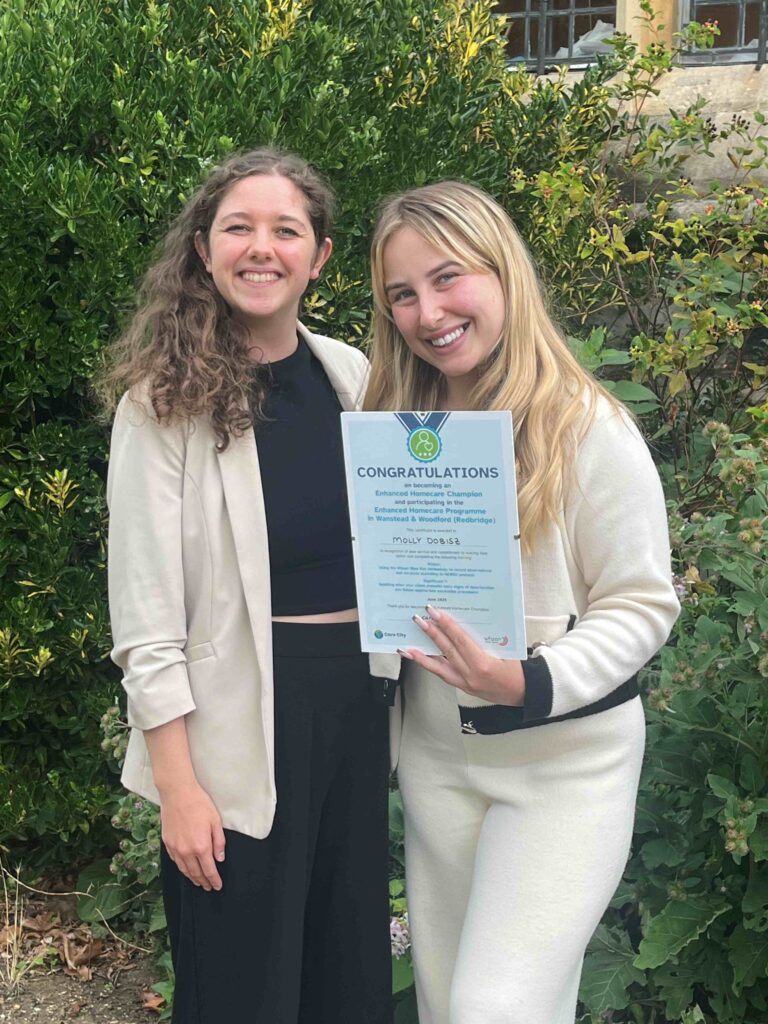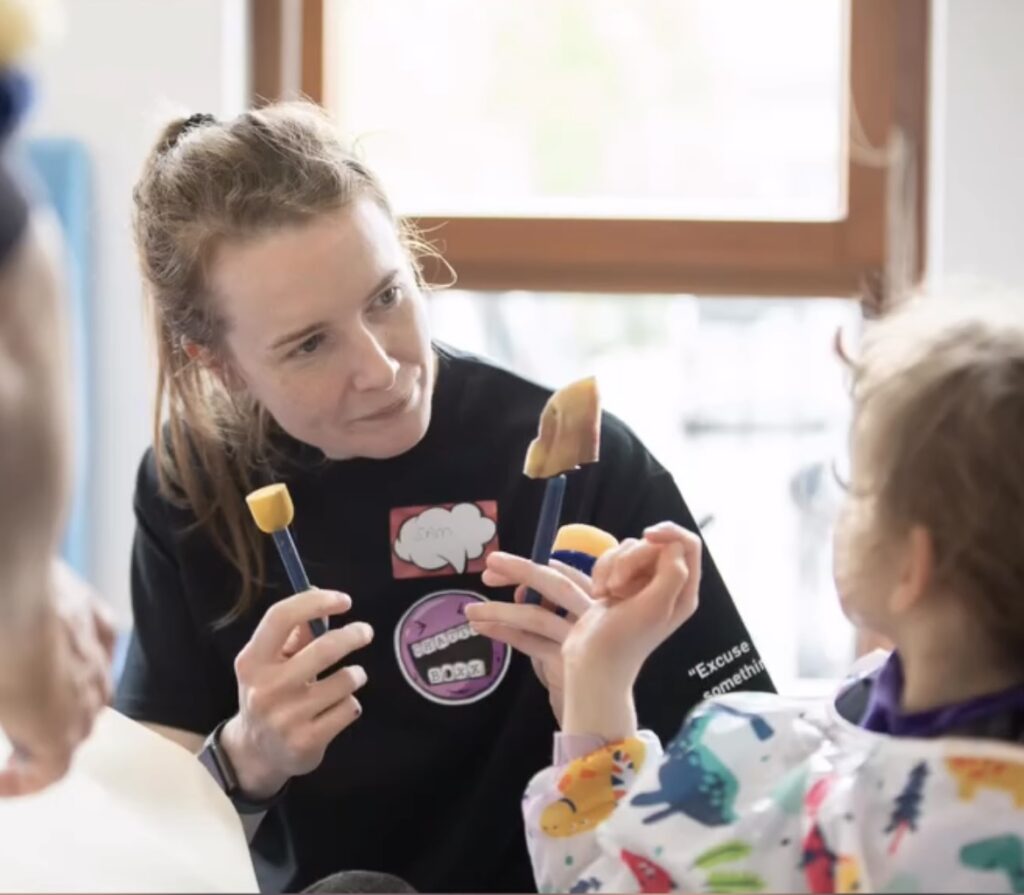From Planning to Practice: Enhanced Homecare Now Live in Redbridge

In her blog, Pia Barna shares the journey of launching Enhanced Homecare in Redbridge – a practical, person-centred model for preventative care shaped by persistence, partnership, and real-world learning.
Nearly a year ago, I shared some reflections on the rollercoaster of delivering innovation in care, shifting timelines, changing priorities, and the real-world messiness that often accompanies meaningful system change. At the heart of those reflections was the Enhanced Homecare project, which we’ve been working to launch in Redbridge since 2022. What began as a promising concept is now a live, working model, one that aligns closely with the ambitions of the NHS 10-Year Plan and offers practical insight into how person-centred, preventative care can take root in the community.
The Enhanced Homecare model forms a response to three persistent challenges often faced by domiciliary care providers: lack of, or unclear escalation guidance, limited focus on preventative care and communication barriers between health and social care. These are precisely the kinds of systemic issues the NHS 10-Year Plan seeks to address, particularly its commitment to supporting people to age well at home, integrating services, and reducing avoidable hospital admissions.
To progress a concept of supporting homecare staff to spot early signs of deterioration in their clients and improve the escalation path to ensure quicker responses, Care City was awarded funding by the North East London Integrated Care Board (ICB). Around this time last year, we had just been granted clinical sign off for the pilot and were busy mobilising all stakeholders and working on going live.
In May of this year, we celebrated a huge milestone with Care Nexus (formerly Kare Plus) officially starting regular health checks on several selected clients and working closely with Wanstead & Woodford PCN to improve clinical escalation pathways. With the 10-Year Plan specifically highlighting ambitions to increase the use of remote monitoring solutions, we are incredibly proud that this approach has already been put in motion in Redbridge.
“At Care Nexus, we feel privileged to have been chosen to pilot this scheme. Being trained to use the Whzan remote monitoring technology has empowered our Domiciliary Carers – they feel more trusted, recognised for their skills, and proud to be part of something that’s enhancing care in the community. Although it’s outside their usual remit, the training has made them feel competent and confident, and they’re embracing the added responsibility.
It hasn’t always been easy, but we’re learning and seeing real benefits. This programme has the potential to save lives and transform care. That’s why we do this work: to help people maintain their quality of life and stay in their homes for as long as possible. If we can keep even one person out of hospital, it’s a success, but we’re excited by the potential to scale and support many more.”
Molly Dobisz, Training Manager, Care Nexus
Reflections
Our experience with Enhanced Homecare offers a practical, ground-level view of what it takes to bring such ambitions to life: not only policy direction, but persistence, adaptability, and close collaboration across systems. As national strategies evolve, it’s projects like these that provide valuable insight into how transformation can take root locally, one person’s journey at a time.
As mentioned previously, this project didn’t quite follow the timeline we initially envisioned. While we had hoped to launch and complete delivery in 2022, the reality proved more complex. Over the past three years, we navigated a series of shifting priorities and practical challenges, governance, engagement, capacity, timing and training, to name a few. Rather than seeing this as a delay, we’ve come to view it as a necessary evolution, a period that allowed us to refine our approach, strengthen partnerships and adapt our model to real-world conditions.
So, how did it finally happen now, you may wonder?
Relentless Commitment from Partners – First and foremost, I am convinced that the persistence of our commissioners at the ICB, our partners at London Borough of Redbridge, Wanstead & Woodford PCN and Care Nexus, has played a significant role in seeing this idea through. There were opportunities to step away, but we held on to our vision and to the benefits we knew it could achieve.
Recommendation: Identify and nurture champions across your partnership early. Shared belief in the project’s value is critical to sustaining momentum when challenges arise.
Streamlining Governance for Agility – We made one crucial change to the governance structure: we downsized the group of people involved in our regular delivery group meetings significantly, from over 20 to just 5, so that only one key individual would represent each organisation. We found that discussions and decision making instantly became much more efficient in a smaller forum, ownership was much clearer, and we had the possibility to problem-solve effectively. In this context, smaller is smarter!
Recommendation: Keep your core delivery group lean and focused. Smaller, empowered teams enable faster decisions, clearer ownership, and more agile problem-solving.
Simplifying the Escalation Model – We adapted the escalation model to remove some complexities: initially, the project intended to trial a new escalation model involving a “Single Point of Contact” operating at the HASS Team within NELFT. We didn’t manage to get the governance quite right to set up the Single Point of Contact in the timeframe that we were hoping for and decided to explore a direct escalation model between the care provider and the GP practices instead. This shift accelerated the implementation.
Recommendation: If a process feels too complex to implement in real time, simplify. Start with what’s workable now and iterate later once the basics are in place.
Starting Small and Focused – We also scaled down to working with one provider instead of two and focusing on a small, committed cohort of staff and clients. Here, we felt that the important thing was to find a starting point, instead of waiting until it was bigger, better, perfect.
Recommendation: Don’t wait for the perfect conditions. Begin with a small, committed group to build confidence, learn quickly, and create a strong foundation for future scaling.
Balancing Data with Stories: A Mixed but Human-Centred Evaluation Approach – With a smaller cohort, we needed to rethink our evaluation strategy. While quantitative data still had a role to play, we knew it wouldn’t fully capture the nuances of impact. We chose to focus more on individual patient journeys, allowing us to gather richer, more grounded insights and to tell a more human story of what’s working, what’s meaningful, and where we may need to refine our approach.
Recommendation: Use both data and lived experience to evaluate impact. In smaller pilots, qualitative insights can reveal what numbers alone can’t and help shape more responsive care models.
Rethinking Training Delivery – We initially trialled group training sessions, but scheduling proved difficult. Our solution: appointing a dedicated nurse educator and competency assessor who delivered recurring sessions tailored to individual needs. Her trusted presence helped staff feel confident and supported in learning to deliver health checks using Whzan.
Recommendation: Tailor training to the realities of your workforce. 121 or small group sessions may be slower to deliver, but they build trust, skills and confidence more effectively.
Developing Practical Training Tools – To reinforce learning and build consistency, we created detailed checklists for staff to follow. These materials supported day-to-day delivery, promoted consistency, and reassured staff as they adapted to new processes.
Recommendation: Support new processes with simple, visual tools like checklists. These help staff embed changes in daily practice and ensure consistency across care teams.
Of course, there were other milestones: Information Governance sign-off, for one – always a big moment and cause for celebration in any health or care project! But we also made space to celebrate smaller wins: staff members passing their competency assessments, onboarding the first participants, taking the first readings in the community. These milestones were so crucial on the journey of pushing this project over the starting line and building the very foundations to build on once we are ready to scale and expand.
A combination of all of the above-mentioned changes and shifts made it possible for Care Nexus to deliver their first scheduled health checks in May 2025. So far, all their clients are well and healthy, which is reassuring to hear! And should anyone become unwell, we now have the processes in place to enable a quick escalation to their GP.
With special thanks to:
- Louise Keane for training delivery
- Care Nexus
- Wanstead and Woodford Primary Care Network
- North East London Integrated Care Board
- London Borough of Redbridge
- Whzan



